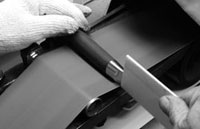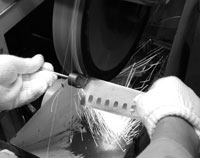Shun Pro 6-1/2-Inch Deba Knife
From Seki City, Japan, the beautiful and razor-sharp Shun Pro Deba knife is a perfect companion for filleting fish, beef, poultry or chopping vegetables. Deba knives are typically lighter and deliver precision cuts, making them an alternative to the chef's knife. Made from VG-10 high-carbon steel, the Shun Pro blade is designed to take and hold its sharp edge longer than comparable knives. Its wide shinogi (blade bevel) is easy to sharpen with a whetstone. The premium D-shaped Pakka Wood handles rest comfortably in the curve of a palm, giving precision control, and a secure grip. The single-bevel blade delivers superior sweep and razor-sharp slicing ability. The beautiful graffiti-etched blade delivers a balance of both style and performance, making this knife a treasured addition to any kitchen. Thought the knife is dishwasher safe, it is recommended that hand washing and air drying will better preserve the knife. The knife is available in 8-, 7-, and 4-inch sizes. It comes backed by a limited lifetime warranty.

For the true Japanese food aficionado, nothing compares to the scalpel-like precision of a single bevel blade. The newly updated Shun Pro line features the same incredibly sharp chisel edges as in the past, combined with D-shaped PakkaWood handles, which lend a secure and comfortable grip. The beautiful graffiti-etched blade is made with high carbon VG10 steel, which takes and holds an edge longer than comparable knives. The blade backs are gently hollow ground, creating an air pocket between the knife and the food being cut, so the knife glides through food with quick precision. For those chefs who are truly into the Japanese method of cooking, the wide Shinogi (or blade bevel) makes sharpening these knives on a whetstone practically effortless. Knife styles in this line include the Deba (a multi-purpose prep knife), the Yanagiba (a long slicing knife perfect for sashimi), and the Nakiri (a vegetable chopping knife). These knives are essential for cooks who are seeking to prepare true Asian cuisine.
Whereas a knife made by the kasumi method has a cutting core jacketed with another steel, honyaki knives are made from a single piece of steel--usually very hard, high-carbon steel. Honyaki-method knives can be sharpened to an exquisitely sharp edge and retain that edge for a longer period of time.
Because of the hardness of the steel and the precision of the processes needed to "treat" the steel properly, honyaki knives are more difficult to make and more labor-intensive than kasumi knives. As you might expect, this degree of difficulty makes honyaki knives the most prized and most expensive. The Shun Pro line, which features traditional single-beveled Japanese blade styles, is made by this method.
PakkaWood is a premium handle material made of genuine hardwood impregnated with resin. The resin makes it moisture resistant, strong, and durable. Sanding and buffing brings PakkaWood to a beautiful gloss finish. As with natural wood, no two pieces of PakkaWood are exactly alike.
| Specifications | |
|---|---|
| Blade Material: | VG-10 hardened Japanese steel, made with 2.5 mm blade stock, brushed for a matte finish. |
| Bevel: | Single-beveled with hollow-ground back. |
| Cutting angle: | 16 degrees (comprehensive angle 16 degrees). |
| Handle Material: | Pakkawood (resin-impregnated hardwood); D-shaped handle, only available in right-handed version. |
| Sharpening recommendations: | Regular sharpening (as needed) with a whetstone. Soak the whetstone for about 20 minutes, set on a damp cloth for stability, and pull the knife's edge across the whetstone at a 16 degree angle. The wide Shinogi (bevel) on the knife can be used as a guide, making it easy to maintain the knife's sharpness. |



